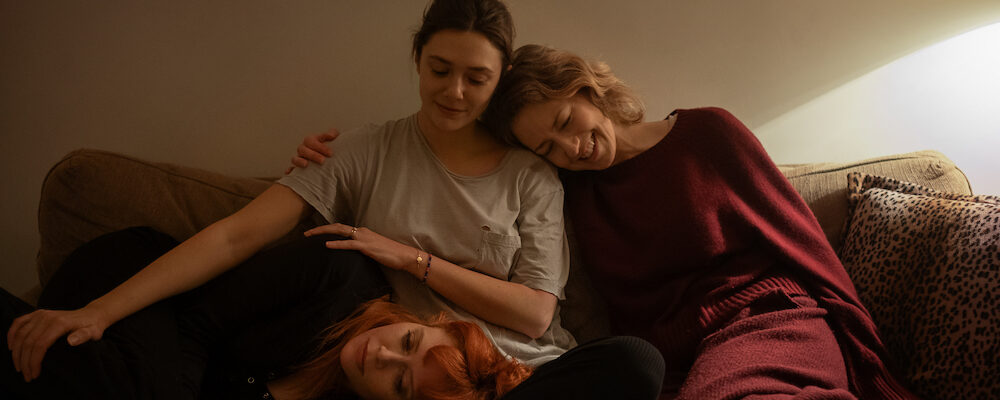‘His Three Daughters’ Confronts the Emotional Perils of Saying Goodbye With Wrenching Honesty
Alci Rengifo
A painful moment of transition or crisis can have quite the revelatory impact on a family. “His Three Daughters” is a simple, immersive drama about a group of sisters dealing with their father’s inevitable passing. Director Azazel Jacobs gathers them into a New York City apartment that becomes a cauldron of memories as well as festering emotions. There is nothing like an emotionally wrenching, collective experience to suddenly bring up everything someone has kept bottled inside. It can feel like bad but necessary timing when grief, combined with stress, finally clears the air. However, Jacobs is not only exploring pain. He is aiming for the core of how complicated love between family can become over the years.
The three daughters of this title are overly serious Katie (Carrie Coon), spacey Christina (Elizabeth Olsen) and scrappy Rachel (Natasha Lyonne), who has been the sister taking care of their now dying father, Vincent (Jay O. Sanders). They spend every waking hour in the Lower East Side apartment where Vincent is under hospice care. Every day their hospice contact (Randy Ramos Jr.) gives an assessment, which can prove grinding as the sisters are on alert every minute for their father’s progress. As the days carry on, with the end feeling near, the contradictions and connections that form this trio get more intense. Rachel is constantly broke, and may seem reckless, but she has been the one with Vincent throughout his decline. Katie and Christina have families and live suburban lifestyles, yet now they want to oversee everything including the obituary. Who they have been to each other becomes an urgent matter as they wait for that painful, inevitable moment to say goodbye.
“His Three Daughters” takes place inside one of those self-contained worlds a director like Ingmar Bergman would have turned into a searing existential journey. This modest apartment is like a membrane forcing the sisters to truly know each other. We only spend time outside of its walls with Rachel, who constantly smokes marijuana and is asked to take it elsewhere by the more uptight Katie. Azazel never takes the camera into Vincent’s bedroom, only the heart rate monitor lets us know he is in there. His film is all about the sisters and their individual personalities. Each one is sharply defined. Through their interactions we learn about them without the need for long, expository monologues. Katie bosses everyone around and likes to take charge. She is also frustrated with a rebellious teenage daughter that she scolds over the phone. Christina lives in some kind of ethereal space in her head, chatting with her baby on the phone and asking Rachel randomly funny questions. We get hints that when she was younger Christina was a party animal, so maybe she has stayed in somewhat of a euphoric zone long after the drugs wore off.
Having never gotten married or had children, Rachel suffers the prejudice of being perceived as the black sheep. She is constantly betting on football games and has no major ambitions. She is also not biologically related to the other two women, since Vincent adopted her when he married her mother. Though, all three women have different mothers since their father was apparently quite a larger than life figure. As tends to happen, Rachel thus comes across as more sober or sane about certain issues. It is easy for others to be condescending and judgmental when they have avoided the real and hard work of taking care of someone. This is a movie driven by moments of very human dialogue, like Rachel’s friend Benji (Jovan Adepo) having the courage that Rachel lacks to tell her sisters they need to have some respect or acknowledgement. All three actors deliver great work where much is said with a glance or a subtle tear. Their faces evoke how when death becomes inevitable regrets can quickly follow. Maybe Katie could have visited more often. Christina didn’t always have to push away help from others. All those small choices that could have meant more time spent with a loved one rush to the surface.
Azazel does not let the screenplay find easy little avenues to extend the plot. No one is fighting over an inheritance, though Rachel gets tired of the other two constantly mentioning that she is lucky to be getting the apartment. What this film is really about crystalizes fully in a wonderfully moving final monologue that brings every key idea together. The three sisters are quite different from one another, but such is the nature of families. Good or bad ones, we get lumped into these clans thanks to decisions made before we were born. We don’t get to choose our siblings or parents. Katie and Christina have no problem walking into that bedroom, yet Rachel can’t. Her experience is different because she has been so close with Vincent for so long. This doesn’t invalidate the other sisters, who can come together so all three can face one of life’s most painful moments of transition. Anyone who has been with a family member that is in hospice will understand the atmosphere of the underlying drama going on around the patient. One of this year’s best dramas, “His Three Daughters” is a moving film about how sometimes it takes loss to make those left behind finally see each other.
“His Three Daughters” releases Sept. 6 in select theaters and begins streaming Sept. 20 on Netflix.

